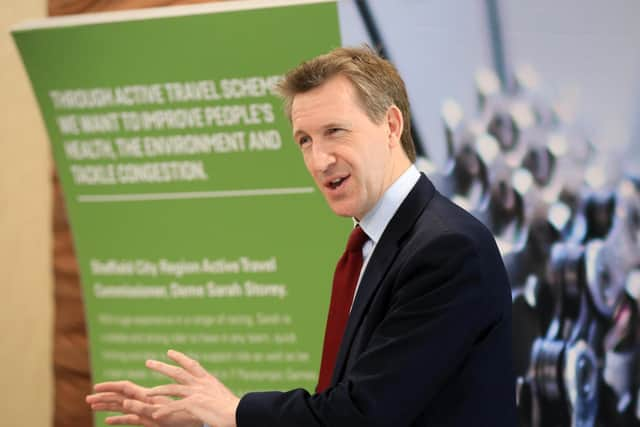Why £30m a year from devolution won't be enough to transform South Yorkshire
Sheffield City Region mayor Dan Jarvis and local leaders are hoping the transfer of powers and resources from Westminster will pass into law by the summer after finally reaching an agreement on devolution earlier this year.
The process is likely to move forward this week at a virtual online meeting where the results of a local consultation about the new powers available to Mr Jarvis will be submitted to Communities Secretary Robert Jenrick.


Advertisement
Hide AdAdvertisement
Hide AdBut a report to be discussed at the Sheffield City Region mayoral combined authority meeting revealed that any delays to the process could mean the benefits of the devolution deal may not be felt until October.
If the timetable for getting government approval is delayed and the legislation is not laid in Parliament before its summer recess, the process may not conclude until the Autumn. The coronavirus pandemic could also lead to further delays.
The Sheffield City Region devolution deal was first agreed with then-Chancellor George Osborne in 2015, before collapsing amid disagreements between council leaders over whether a wider 'One Yorkshire' deal should be pursued.
An agreement was finally reached this year, paving the way for the Government to hand Labour mayor Mr Jarvis 'gainshare' funding of £30m a year and a host of new decision-making powers.
Advertisement
Hide AdAdvertisement
Hide AdAs part of the process for the deal to become law, a six-week consultation was carried out to get the views of local residents and key organisations.
In total 675 responses were received, with a strong majority expressing support for the proposals. A total of 590 people supported the principle of devolution of powers from Westminster, compared with 59 against.
According to the report: "There was a general trend from a significant number of respondents that set out negative views of the current political system, including a perceived dominance of the Greater South East London at the expense of the North."
The most controversial element was the governance and constitutional arrangements for the deal, where 434 people were in support and 136 in opposition.
Advertisement
Hide AdAdvertisement
Hide AdAmong the concerns raised was the perception that the new set-up would lead to greater bureaucracy and cost.
But report author Fiona Boden wrote: "This may be based on the view that this creates another layer of local government, which is not the case given the combined authority has now been in existence for six years."
There was also said to be "uncertainty regarding forthcoming levels of government funding and whether or not this will be sufficient."
According to the report: "Whilst the additional money to be awarded to South Yorkshire through the deal is significant, totalling £30m per annum for 30 years, it alone will not be sufficient to deliver the recognised scale of transformation required in the region.
Advertisement
Hide AdAdvertisement
Hide Ad"Future funding of local government under any model is not guaranteed, but by progressing this deal the mayoral combined authority (MCA) will be eligible to secure further investment from Government, for example, its share of the £4.6bn announced as part of the UK’s 2020 Budget in March."
It added that the mayor could get greater borrowing powers for more than just transport schemes and, if it meets the criteria, gain control over the adult education budget for the area, worth £35m a year.
Ms Boden wrote: "Government has agreed additional funds and powers for other MCAs on a range of issues including housing, homelessness, responding to economic shocks, and employment support.
"Through the Devolution White Paper, the Government is expected to progress its ‘levelling up’ agenda, devolving more to MCAs to progress local priorities."
In December, South Yorkshire was added to a list of Europe’s poorest areas, defined as areas with a GDP per head of the population worth 75 per cent or less of the EU average.
